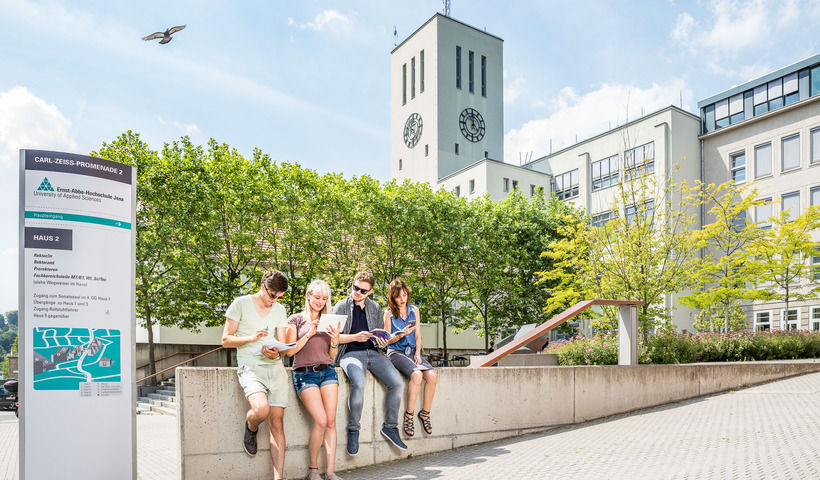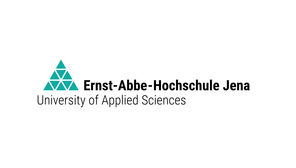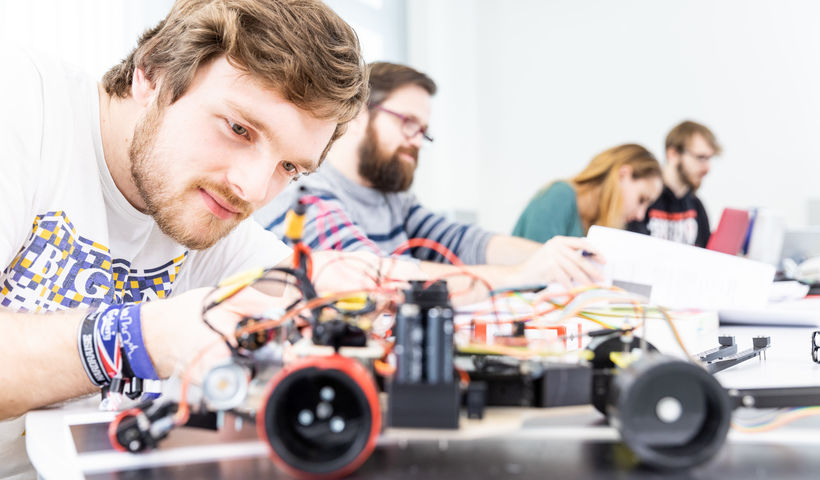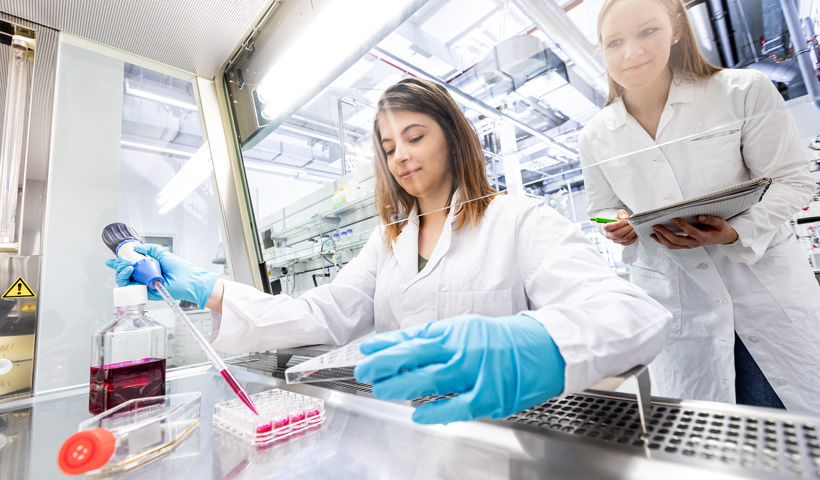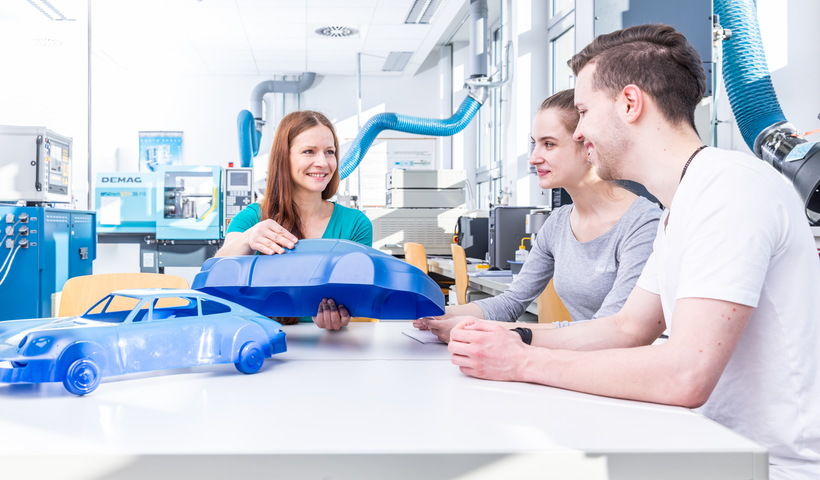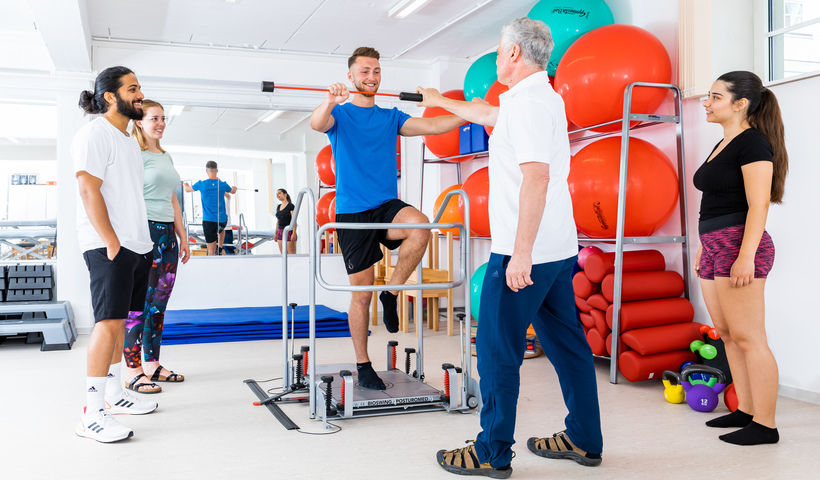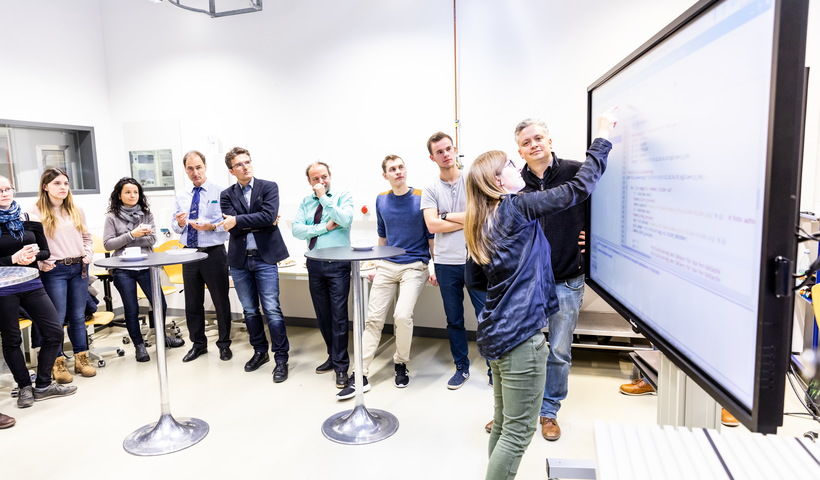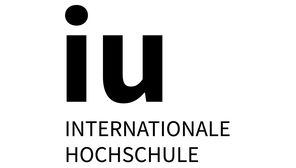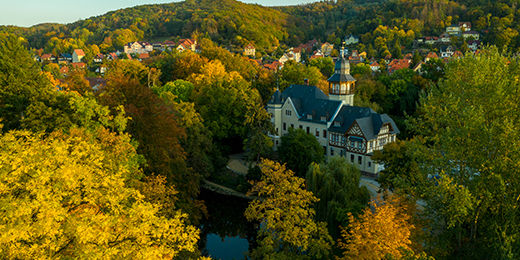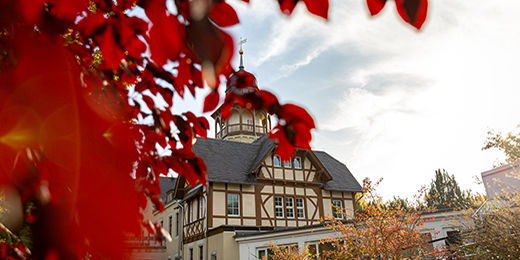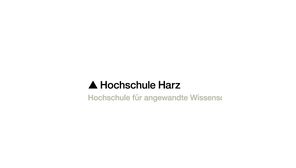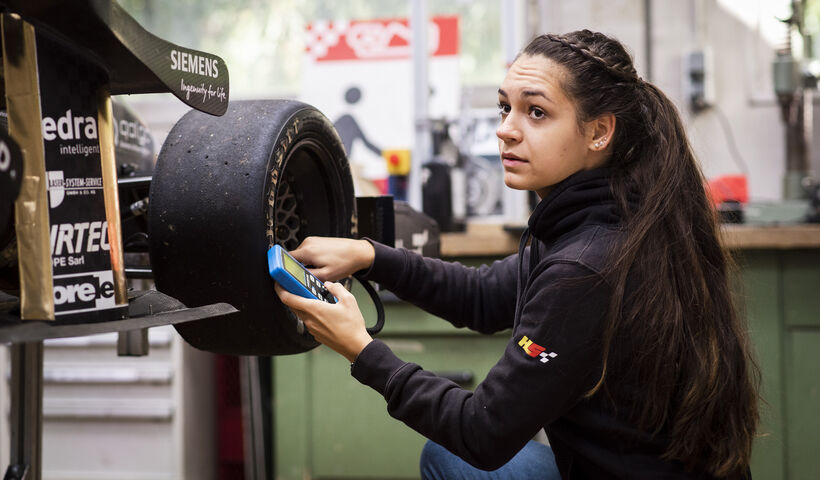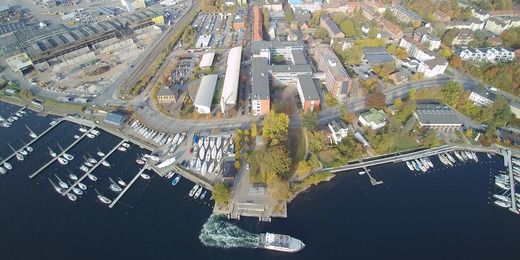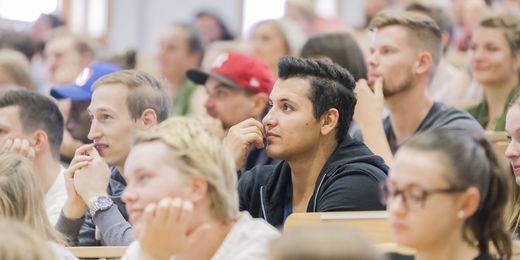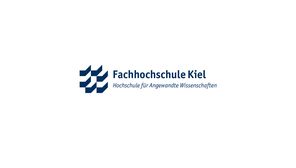Ernst-Abbe-Hochschule Jena - University of Applied Sciences
- Promotionsrecht: Nein
- Trägerschaft: öffentlich-rechtlich
- 1991 gegründet
- 4.330 Studierende
Praxisorientiert und forschungsstark. Interdisziplinär und modern. Familiär und weltoffen.
Das und noch viel mehr zeichnet die Ernst-Abbe-Hochschule Jena aus. Aktuell studieren hier ca. 4.400 junge Menschen im Bachelor und Master in den Bereichen Technik, Wirtschaft, Soziales und Gesundheit.
Hochschule im Fokus
Die Ernst-Abbe-Hochschule (EAH) Jena wurde 1991 als Fachhochschule Jena gegründet und war damit eine der ersten in den Neuen Bundesländern. Seit einigen Jahren ist sie nicht nur Thüringens größte, sondern auch forschungsstärkste Hochschule für angewandte Wissenschaften. Aktuell studieren bei uns ca. 4.400 junge Menschen.
praxisorientiert/anwendungsnah
forschungsstark
attraktiver Campus in der pulsierenden Stadt Jena
Carl-Zeiss-Promenade 2
07745 Jena
Tel: 03641 2050
Hochschule im CHE-Ranking abschneiden.
Die Ernst-Abbe-Hochschule Jena - University of Applied Sciences gehört zu den Fachhochschulen / HAW.
Nein, du kannst an der Ernst-Abbe-Hochschule Jena - University of Applied Sciences nicht promovieren.
Die Ernst-Abbe-Hochschule Jena - University of Applied Sciences ist eine öffentlich-rechtliche Hochschule. Es gibt staatliche und staatlich anerkannte Hochschulen, die meist in Universitäten, Fachhochschulen (international: University of Applied Sciences) und Kunst- sowie Musikhochschulen unterteilt werden. Der überwiegende Teil der Hochschulen wird vom Staat finanziert und befindet sich daher in staatlicher Trägerschaft. Dort fallen in der Regel nur geringe Semesterbeiträge an. An den privaten Hochschulen hingegen, die sich über private Trägerschaften finanzieren, können wesentlich höhere Studiengebühren anfallen. Einen Weg, die finanziellen Hürden dieser Hochschulen zu umgehen, können Stipendien darstellen.
Es gibt außerdem Hochschulen, die von der protestantischen oder katholischen Kirche betrieben werden.
Die Ernst-Abbe-Hochschule Jena - University of Applied Sciences wurde im Jahr 1991 gegründet.
Insgesamt gibt es 4330 Studierende an der Ernst-Abbe-Hochschule Jena - University of Applied Sciences.
Standort dieser Hochschule ist Jena.
Hier findest du die Fristen und Termine für deine Bewerbung:
- Vorlesungszeit:
-
14.10.2024 - 08.02.2025
- Studienanfänger:
-
15.05.2024 - 30.09.2024Die Bewerbungsfrist kann für einige Studiengänge abweichen. Bitte informieren Sie sich auf der Website der Ernst-Abbe-Hochschule Jena über die konkrete Frist Ihres Wunschstudiengangs: https://www.eah-jena.de/studienangebot
- Hochschulwechsler:
-
15.05.2024 - 30.09.2024Die Bewerbungsfrist kann für einige Studiengänge abweichen. Bitte informieren Sie sich auf der Website der Ernst-Abbe-Hochschule Jena über die konkrete Frist Ihres Wunschstudiengangs: https://www.eah-jena.de/studienangebot
- International Studierende aus der Europäischen Union:
-
15.05.2024 - 30.09.2024The application deadline may vary for some degree programmes. Please inform yourself on the website of the University of Applied Sciences Jena about the specific deadline of your desired course of study: https://www.eah-jena.de/studienangebot
If you have any questions regarding admission, please contact: international(at)eah-jena.de
- International Studierende aus Staaten, die nicht Mitglied der EU sind:
-
15.05.2024 - 30.09.2024The application deadline may vary for some degree programmes. Please inform yourself on the website of the University of Applied Sciences Jena about the specific deadline of your desired course of study: https://www.eah-jena.de/studienangebot
Please apply via https://campusportal.eah-jena.de
If you have any questions regarding admission, please contact: international(at)eah-jena.de
- Studienanfänger:
-
15.05.2024 - 15.07.2024Die Bewerbungsfrist kann für einige Studiengänge abweichen. Bitte informieren Sie sich auf der Website der Ernst-Abbe-Hochschule Jena über die konkrete Frist Ihres Wunschstudiengangs: https://www.eah-jena.de/studienangebot
- Hochschulwechsler:
-
15.05.2024 - 15.07.2024Die Bewerbungsfrist kann für einige Studiengänge abweichen. Bitte informieren Sie sich auf der Website der Ernst-Abbe-Hochschule Jena über die konkrete Frist Ihres Wunschstudiengangs: https://www.eah-jena.de/studienangebot
- International Studierende aus der Europäischen Union:
-
15.05.2024 - 15.07.2024The application deadline may vary for some degree programmes. Please inform yourself on the website of the University of Applied Sciences Jena about the specific deadline of your desired course of study: https://www.eah-jena.de/studienangebot
If you have any questions regarding admission, please contact: international(at)eah-jena.de
- International Studierende aus Staaten, die nicht Mitglied der EU sind:
-
15.05.2024 - 15.07.2024The application deadline may vary for some degree programmes. Please inform yourself on the website of the University of Applied Sciences Jena about the specific deadline of your desired course of study: https://www.eah-jena.de/studienangebot
Please apply via https://campusportal.eah-jena.de
If you have any questions regarding admission, please contact: international(at)eah-jena.de
- Studienanfänger:
-
15.05.2024 - 15.09.2024Die Bewerbungsfrist kann für einige Studiengänge abweichen. Bitte informieren Sie sich auf der Website der Ernst-Abbe-Hochschule Jena über die konkrete Frist Ihres Wunschstudiengangs: https://www.eah-jena.de/studienangebot
- Hochschulwechsler:
-
15.05.2024 - 15.09.2024Die Bewerbungsfrist kann für einige Studiengänge abweichen. Bitte informieren Sie sich auf der Website der Ernst-Abbe-Hochschule Jena über die konkrete Frist Ihres Wunschstudiengangs: https://www.eah-jena.de/studienangebot
- International Studierende aus der Europäischen Union:
-
15.05.2024 - 15.09.2024The application deadline may vary for some degree programmes. Please inform yourself on the website of the University of Applied Sciences Jena about the specific deadline of your desired course of study: https://www.eah-jena.de/studienangebot
If you have any questions regarding admission, please contact: master(at)eah-jena.de
- International Studierende aus Staaten, die nicht Mitglied der EU sind:
-
15.05.2024 - 15.09.2024The application deadline may vary for some degree programmes. Please inform yourself on the website of the University of Applied Sciences Jena about the specific deadline of your desired course of study: https://www.eah-jena.de/studienangebot
Please apply via https://campusportal.eah-jena.de
If you have any questions regarding admission, please contact: master(at)eah-jena.de
- Vorlesungszeit:
-
01.04.2024 - 13.07.2024
- Studienanfänger:
-
Die Frist ist abgelaufen
- Hochschulwechsler:
-
Die Frist ist abgelaufen
- International Studierende aus der Europäischen Union:
-
Die Frist ist abgelaufen
- International Studierende aus Staaten, die nicht Mitglied der EU sind:
-
Die Frist ist abgelaufen
- Studienanfänger:
-
Die Frist ist abgelaufen
- Hochschulwechsler:
-
Die Frist ist abgelaufen
- International Studierende aus der Europäischen Union:
-
Die Frist ist abgelaufen
- International Studierende aus Staaten, die nicht Mitglied der EU sind:
-
Die Frist ist abgelaufen
- Studienanfänger:
-
Die Frist ist abgelaufen
- Hochschulwechsler:
-
Die Frist ist abgelaufen
- International Studierende aus der Europäischen Union:
-
Die Frist ist abgelaufen
- International Studierende aus Staaten, die nicht Mitglied der EU sind:
-
Die Frist ist abgelaufen
- Studienanfänger:
-
Die Frist ist abgelaufen
- Hochschulwechsler:
-
Die Frist ist abgelaufen
- International Studierende aus der Europäischen Union:
-
Die Frist ist abgelaufen
- International Studierende aus Staaten, die nicht Mitglied der EU sind:
-
Die Frist ist abgelaufen
Als Fakultät wird eine Gruppe von Fächern oder eine Abteilung mit mehreren Wissenschaftsbereichen bezeichnet. Sie bildet eine
Lehr- und Verwaltungseinheit und ist für die Organisation von Forschung, Lehre und dem Studium an sich des jeweiligen Fachbereichs
verantwortlich.
An der Ernst-Abbe-Hochschule Jena - University of Applied Sciences gibt es folgende Fakultäten und Fachbereiche:
Folgende Fachbereiche bestehen an der Ernst-Abbe-Hochschule Jena.
- Betriebswirtschaft
- Elektrotechnik und Informationstechnik
- Gesundheit und Pflege
- Grundlagenwissenschaften
- Maschinenbau
- Medizintechnik und Biotechnologie
- SciTec
- Sozialwesen
- Wirtschaftsingenieurwesen
- Vorlesungszeit:
-
14.10.2024 - 08.02.2025
- Studienanfänger:
-
15.05.2024 - 30.09.2024Die Bewerbungsfrist kann für einige Studiengänge abweichen. Bitte informieren Sie sich auf der Website der Ernst-Abbe-Hochschule Jena über die konkrete Frist Ihres Wunschstudiengangs: https://www.eah-jena.de/studienangebot
- Hochschulwechsler:
-
15.05.2024 - 30.09.2024Die Bewerbungsfrist kann für einige Studiengänge abweichen. Bitte informieren Sie sich auf der Website der Ernst-Abbe-Hochschule Jena über die konkrete Frist Ihres Wunschstudiengangs: https://www.eah-jena.de/studienangebot
- International Studierende aus der Europäischen Union:
-
15.05.2024 - 30.09.2024The application deadline may vary for some degree programmes. Please inform yourself on the website of the University of Applied Sciences Jena about the specific deadline of your desired course of study: https://www.eah-jena.de/studienangebot
If you have any questions regarding admission, please contact: international(at)eah-jena.de
- International Studierende aus Staaten, die nicht Mitglied der EU sind:
-
15.05.2024 - 30.09.2024The application deadline may vary for some degree programmes. Please inform yourself on the website of the University of Applied Sciences Jena about the specific deadline of your desired course of study: https://www.eah-jena.de/studienangebot
Please apply via https://campusportal.eah-jena.de
If you have any questions regarding admission, please contact: international(at)eah-jena.de
- Studienanfänger:
-
15.05.2024 - 15.07.2024Die Bewerbungsfrist kann für einige Studiengänge abweichen. Bitte informieren Sie sich auf der Website der Ernst-Abbe-Hochschule Jena über die konkrete Frist Ihres Wunschstudiengangs: https://www.eah-jena.de/studienangebot
- Hochschulwechsler:
-
15.05.2024 - 15.07.2024Die Bewerbungsfrist kann für einige Studiengänge abweichen. Bitte informieren Sie sich auf der Website der Ernst-Abbe-Hochschule Jena über die konkrete Frist Ihres Wunschstudiengangs: https://www.eah-jena.de/studienangebot
- International Studierende aus der Europäischen Union:
-
15.05.2024 - 15.07.2024The application deadline may vary for some degree programmes. Please inform yourself on the website of the University of Applied Sciences Jena about the specific deadline of your desired course of study: https://www.eah-jena.de/studienangebot
If you have any questions regarding admission, please contact: international(at)eah-jena.de
- International Studierende aus Staaten, die nicht Mitglied der EU sind:
-
15.05.2024 - 15.07.2024The application deadline may vary for some degree programmes. Please inform yourself on the website of the University of Applied Sciences Jena about the specific deadline of your desired course of study: https://www.eah-jena.de/studienangebot
Please apply via https://campusportal.eah-jena.de
If you have any questions regarding admission, please contact: international(at)eah-jena.de
- Studienanfänger:
-
15.05.2024 - 15.09.2024Die Bewerbungsfrist kann für einige Studiengänge abweichen. Bitte informieren Sie sich auf der Website der Ernst-Abbe-Hochschule Jena über die konkrete Frist Ihres Wunschstudiengangs: https://www.eah-jena.de/studienangebot
- Hochschulwechsler:
-
15.05.2024 - 15.09.2024Die Bewerbungsfrist kann für einige Studiengänge abweichen. Bitte informieren Sie sich auf der Website der Ernst-Abbe-Hochschule Jena über die konkrete Frist Ihres Wunschstudiengangs: https://www.eah-jena.de/studienangebot
- International Studierende aus der Europäischen Union:
-
15.05.2024 - 15.09.2024The application deadline may vary for some degree programmes. Please inform yourself on the website of the University of Applied Sciences Jena about the specific deadline of your desired course of study: https://www.eah-jena.de/studienangebot
If you have any questions regarding admission, please contact: master(at)eah-jena.de
- International Studierende aus Staaten, die nicht Mitglied der EU sind:
-
15.05.2024 - 15.09.2024The application deadline may vary for some degree programmes. Please inform yourself on the website of the University of Applied Sciences Jena about the specific deadline of your desired course of study: https://www.eah-jena.de/studienangebot
Please apply via https://campusportal.eah-jena.de
If you have any questions regarding admission, please contact: master(at)eah-jena.de
- Vorlesungszeit:
-
01.04.2024 - 13.07.2024
- Studienanfänger:
-
Die Frist ist abgelaufen
- Hochschulwechsler:
-
Die Frist ist abgelaufen
- International Studierende aus der Europäischen Union:
-
Die Frist ist abgelaufen
- International Studierende aus Staaten, die nicht Mitglied der EU sind:
-
Die Frist ist abgelaufen
- Studienanfänger:
-
Die Frist ist abgelaufen
- Hochschulwechsler:
-
Die Frist ist abgelaufen
- International Studierende aus der Europäischen Union:
-
Die Frist ist abgelaufen
- International Studierende aus Staaten, die nicht Mitglied der EU sind:
-
Die Frist ist abgelaufen
- Studienanfänger:
-
Die Frist ist abgelaufen
- Hochschulwechsler:
-
Die Frist ist abgelaufen
- International Studierende aus der Europäischen Union:
-
Die Frist ist abgelaufen
- International Studierende aus Staaten, die nicht Mitglied der EU sind:
-
Die Frist ist abgelaufen
- Studienanfänger:
-
Die Frist ist abgelaufen
- Hochschulwechsler:
-
Die Frist ist abgelaufen
- International Studierende aus der Europäischen Union:
-
Die Frist ist abgelaufen
- International Studierende aus Staaten, die nicht Mitglied der EU sind:
-
Die Frist ist abgelaufen
Folgende Fachbereiche bestehen an der Ernst-Abbe-Hochschule Jena.
- Betriebswirtschaft
- Elektrotechnik und Informationstechnik
- Gesundheit und Pflege
- Grundlagenwissenschaften
- Maschinenbau
- Medizintechnik und Biotechnologie
- SciTec
- Sozialwesen
- Wirtschaftsingenieurwesen
Studienangebot
Das Studienangebot der EAH Jena fokussiert die Themenbereiche Technik, Wirtschaft, Soziales und Gesundheit und zeichnet sich durch einen hohen Praxisbezug aus. Letzteren gewährleistet die Hochschule insbesondere durch ihre Einbindung in verschiedene Netzwerke, die Berufung von Professorinnen und Professoren aus der Wirtschaft sowie durch Projekt- und Forschungsarbeiten, Praktika, Exkursionen und Abschlussarbeiten mit zahlreichen Kooperationspartnern. Zudem werden Planspiele, Fallstudien und Praxisvorträge in den Lehrplan integriert, fächerübergreifende Veranstaltungen angeboten sowie coachingbasierte Betreuungsleistungen, wie z. B. die des Career Service und des Gründerservice, zur Verfügung gestellt. Die Bachelor- und Masterstudiengänge der EAH Jena erfüllen einen hohen wissenschaftlichen Anspruch und gleichzeitig die praktischen Anforderungen an Fach- und Führungskräfte von morgen.
Forschung und Transfer sowie Internationales
Die EAH Jena arbeitet eng mit Partnern aus Wirtschaft und Wissenschaft zusammen. Die Forschungsfelder in den Schwerpunkten "Präzisionssysteme", "Technologien und Werkstoffe" sowie "Gesundheit und Nachhaltigkeit" spiegeln sowohl technisch als auch gesellschaftlich aktuelle Themen wider. Hinzu kommt das Querschnittsfeld Digitalisierung, bei dem verschiedene Aspekte der Industrie 4.0 untersucht werden. Dieses Zusammenspiel unterschiedlichster Fachdisziplinen ermöglicht eine kreative und innovative Herangehensweise an Forschungsthemen und Problemstellungen. Die Hochschule versteht die Kooperation mit der Wirtschaft und der Gesellschaft grundsätzlich als multidirektionale Interaktion. Daher unterstützen wir sowohl Forschende und Lehrende als auch externe Partner bei Transferaktivitäten. Zudem fördern wir den Wissenstransfer über Praktika, Abschlussarbeiten und Promotionsvorhaben sowie durch aktive Unterstützung und Begleitung bei Existenzgründungsprojekten.
Die EAH Jena kooperiert weltweit mit zahlreichen Hochschulen und Forschungseinrichtungen. Sie fördert damit den Austausch von Studierenden, Wissenschaftlerinnen und Wissenschaftlern sowie von Ideen und Knowhow. Der Anteil von Austauschstudierenden steigt kontinuierlich. Auch Lehrende der EAH Jena arbeiten zeitweise an Hochschulen Europas, Asiens, Afrikas und Amerikas. Diese Entwicklung wird durch zahlreiche Kooperationsverträge gezielt gefördert. Ein Schwerpunkt der Internationalisierung ist die Zusammenarbeit im Rahmen des ERASMUS+-Programms der Europäischen Union. Der Anteil der internationalen Studierenden beträgt rund 22 %. Auslandsstudium und -praktikum sind in einigen Studiengängen ins Curriculum integriert.


